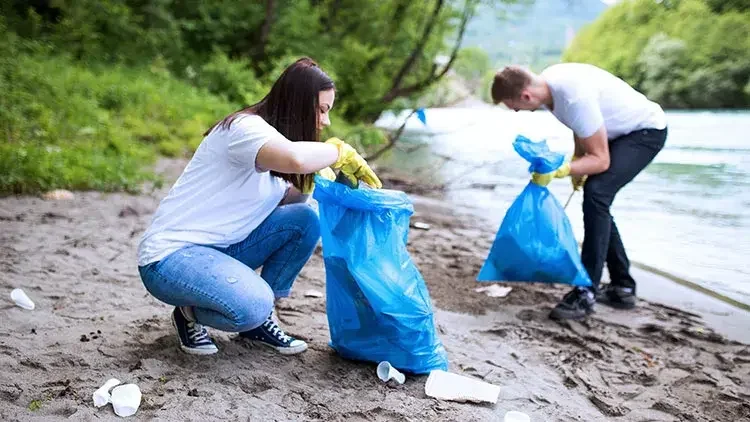For more than 50 years, Earth Day has advocated the importance of protecting our planet and restoring the world's ecosystems through reuse, recycling, and repurposing. Though Earth Day has significantly raised awareness, there's still much to do. The good news is doing right by the planet doesn't have to be expensive or time-consuming.
Since LegalZoom is all about innovative thinking, it's no surprise that our employees have come up with some smart and resourceful ways to reuse, repurpose, and recycle. Here are some of their best ideas to get your wheels turning.

Reuse before you recycle
Recycling is wonderful, but much of the plastic people believe they're recycling actually ends up in a landfill due to poor condition or low demand in the recycling market. Reusing helps you get more mileage out of items you might be thinking of throwing away. It also helps reduce energy by cutting down on manufacturing and keeps waste out of our landfills.
Account representative Patti Greene not only reuses grocery bags, but she also reuses the plastic produce bags. “My husband and I are long-time advocates of Reduce/Reuse/Recycling. We reuse plastic bottles for water and tea and store drinks in them...then we recycle them. Loving our planet more and more for those we are leaving behind!"
Aimee Greni, email chat specialist, practices sustainability by buying second-hand clothes. It's more beneficial than you may realize because it reduces manufacturing pollution, limits pesticide use, and keeps clothes out of landfills. And as most fashionistas will tell you, it's also hip!" says Aimee.
Recycle more than plastic
Throwing plastic bottles into a recycling bin is already second nature for most people. But there are other materials worth recycling that can help reduce greenhouse gases and produce natural alternatives to toxic materials.
Take wine corks, for example. Robyn Nedelcu, an email specialist, has been recycling corks for 2-3 years. Recycling natural wine corks is one of the easiest sustainable changes you can make, Nedelcu explains, "and it creates a natural, sustainable alternative to petroleum-based foams and plastics that damage our planet." Robyn recycles all of her wine corks through a resource she found on recork.com.
Into juicing? When you throw that leftover pulp into the trash, it goes into a landfill (in a plastic bag no less), where it decomposes and produces methane, a greenhouse gas that can contaminate the soil and the groundwater. Senior manager, Laura Sharfman, tackles the problem by recycling some of her juice pulp into freshly-baked muffins.
Repurpose with purpose
Repurposing is all about finding usable items and turning them into something else someone can use. It's even more energy-efficient than recycling.
Onboarding specialist, Brendan Fitzgerald, repurposed wood from a furniture pallet and turned it into a garden planter for his mom. “My parents own a furniture store, and the furniture is delivered on these wooden pallets," he explained.
Brendan, who had never done any woodworking before, got helpful instruction from a YouTube video. It only took him a few days to finish the project. “I'd tell people, there's so much extra stuff out there, use it for something else."
Kate Mayfield, an editor in Legal Zoom's article center, had no idea how much waste kids can create until she became a mom. “Craft kits for kids use a lot of plastic and have wasteful packaging, not to mention the materials used in the crafts themselves," she says. To let her kids get creative with less waste, Kate began repurposing materials from her kitchen. “I started saving things like cardboard boxes, plastic bread tabs and bottle caps. Other than the glue sticks, we rarely buy craft supplies anymore."
Another material that may not come immediately to mind, but that's worth repurposing is animal waste. In landfills, it contributes to groundwater contamination and air pollution. Alexis Doris, Director of Digital Testing & Optimization, discovered a great way to repurpose this material in her own backyard.
Seeking an ecological and budget-friendly source of dirt for her new garden beds, she says, “My husband found a ranch that delivered soil and horse manure that was already mixed together." It was much cheaper than buying bags of potting soil, not to mention it eliminated the plastic bags most potting soils come in.
Gardening kept the manure out of the landfill, Alexis saved money on very nutrient-rich soil, and her garden thrived. “From late spring and into the fall I never had to buy a tomato. I haven't bought herbs for a year."

